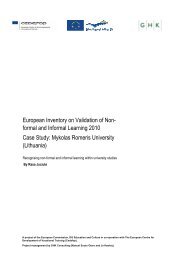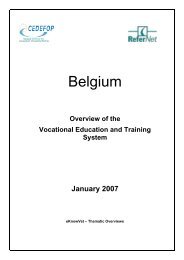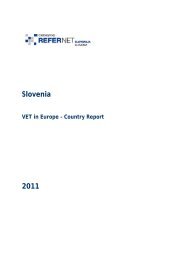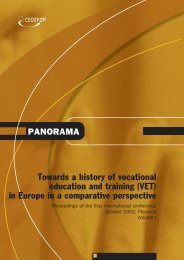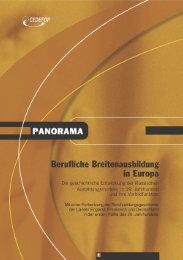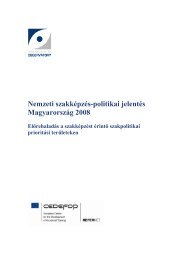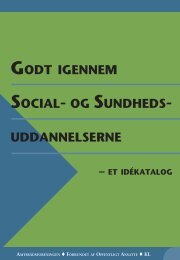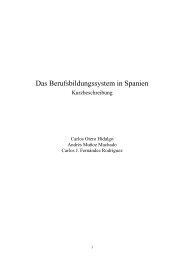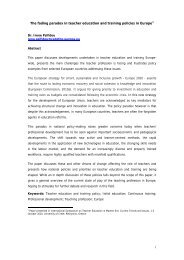PROFF – Professionalisation of VET teachers for the future - Europa
PROFF – Professionalisation of VET teachers for the future - Europa
PROFF – Professionalisation of VET teachers for the future - Europa
You also want an ePaper? Increase the reach of your titles
YUMPU automatically turns print PDFs into web optimized ePapers that Google loves.
The studies show some <strong>of</strong> <strong>the</strong> strategies programmes have used to provide <strong>the</strong>se skills to <strong>VET</strong><strong>teachers</strong> and trainers. Several different programmes display <strong>the</strong> same basic trends. In manycountries in Europe, continuing <strong>VET</strong> teacher training programmes have adopted a ‘dualistic’approach, in which <strong>the</strong>oretical work alternates with practical work in <strong>the</strong>ir own school.Ano<strong>the</strong>r trend is that <strong>teachers</strong> work in companies <strong>for</strong> two to three months in so-called on-<strong>the</strong>joblearning schemes to update <strong>the</strong>ir vocational competences. Participants agree that suchprogrammes provide an invigorating experience, stimulating <strong>the</strong>ir motivation and addingrealism to <strong>the</strong>ir training. By participating in on-<strong>the</strong>-job learning <strong>teachers</strong> create ties withinstructors and managers in <strong>the</strong> companies where <strong>the</strong>y are placed. These ties may later help<strong>the</strong>m provide support <strong>for</strong> <strong>the</strong>ir students. At <strong>the</strong> same time, close contact with pr<strong>of</strong>essional<strong>VET</strong> <strong>teachers</strong> may be useful <strong>for</strong> workplace instructors, who <strong>of</strong>ten have received no teachertraining.On accreditation, <strong>PROFF</strong> detected a degree <strong>of</strong> convergence between practices in differentcountries <strong>–</strong> all <strong>of</strong> which treat accreditation as important. Some programmes considered by<strong>PROFF</strong> provide a full course <strong>of</strong> study leading to a university degree or o<strong>the</strong>r <strong>for</strong>ms <strong>of</strong> teachercertification. Most o<strong>the</strong>r programmes, while shorter, provide credits which participants canuse in subsequent fur<strong>the</strong>r education. Sometimes, course certificates enable participants to winpromotion and/or pay increases.One area where <strong>the</strong> project did not detect convergence was in funding models. There are greatdifferences between approaches in different countries. In some, <strong>the</strong> main source <strong>of</strong> funding is<strong>the</strong> European Social Fund, meaning uncertainty in <strong>future</strong> given <strong>the</strong> inevitable trend to divert<strong>the</strong>se funds towards <strong>the</strong> new Member States. In o<strong>the</strong>rs, funding is provided by local, regionalor central government or directly from training institutes’ own budgets. In several countriestrainees pay <strong>for</strong> a part or even all <strong>the</strong>ir training. In o<strong>the</strong>rs it is provided free. A review <strong>of</strong> <strong>the</strong>case studies suggests that <strong>of</strong>ten teacher access to training is constrained by lack <strong>of</strong> adequatefinancial support.Ano<strong>the</strong>r critical issue addressed by <strong>the</strong> project is <strong>teachers</strong>’ pr<strong>of</strong>essional wellbeing, an unjustlyneglected important topic, in a period when national <strong>VET</strong> systems are struggling to recruitnew <strong>VET</strong> <strong>teachers</strong> and keep <strong>the</strong>ir existing staff. The case studies identify several importantissues <strong>for</strong> teacher welfare and provide concrete examples <strong>of</strong> strategies designed to improve<strong>teachers</strong>’ satisfaction with <strong>the</strong>ir work. The study identified a key need <strong>for</strong> a ‘collegialapproach’ which can contribute significantly to reducing <strong>teachers</strong>’ workloads.The study looks at <strong>the</strong> impact <strong>of</strong> <strong>the</strong> programmes examined in <strong>the</strong> case studies. Although acomplete evaluation is not yet possible, school managements believe <strong>the</strong>y have had a positiveimpact on teacher skills and motivation. This assessment is shared by most programmeparticipants, who none <strong>the</strong> less make several suggestions <strong>for</strong> improvement. Important is <strong>the</strong>demand <strong>for</strong> stronger management commitment, ensuring that <strong>teachers</strong> have enough time totake part in in-service training programmes, even when <strong>the</strong>se conflict with <strong>the</strong> short-termpriorities <strong>of</strong> <strong>the</strong> training institutes where <strong>the</strong>y work.6



